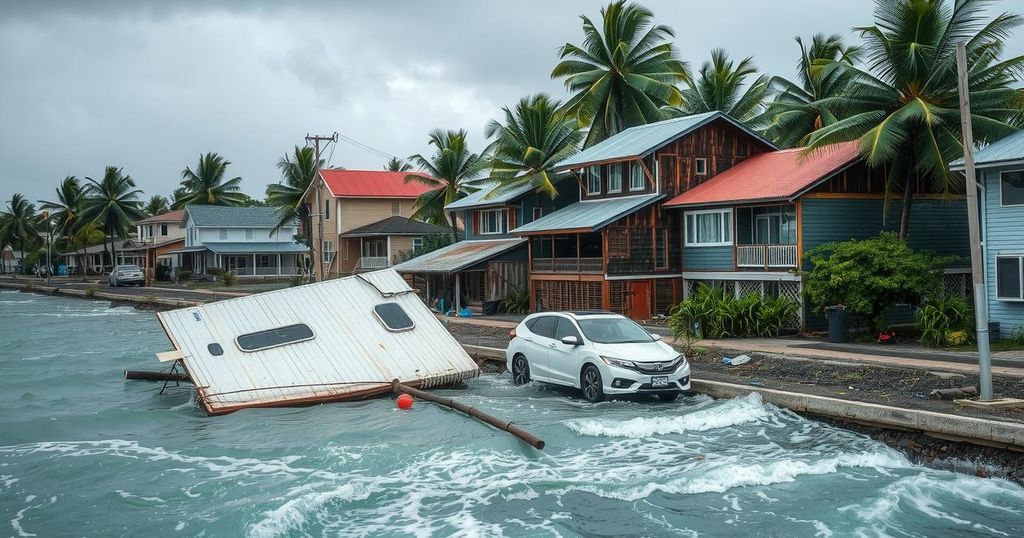Tropical Cyclone Chido: A Devastating Force in Mayotte
Tropical cyclone Chido hit Mayotte on December 14, bringing wind speeds exceeding 200 km/h and heavy rainfall, resulting in significant destruction and loss of life. The French government declared national mourning while Météo-France assessed the unusual trajectory of the storm. The upcoming cyclone season is projected to exhibit increased activity, indicating a pressing need for readiness in impacted regions.
Tropical cyclone Chido made a catastrophic impact on Mayotte on December 14, 2023, with sustained winds exceeding 200 kilometers per hour and gusts surpassing 225 kilometers per hour. It was reported to be the strongest storm to affect Mayotte in nearly a century, according to Météo-France. The cyclone brought torrential downpours, registering 176 millimeters of rain within a mere twelve-hour window and generating dangerously high sea conditions with significant wave heights of over five meters. Notably, the cyclone’s intensity was so severe that it caused damage to Météo-France’s own observation facilities.
In response to the devastation, French President Emmanuel Macron declared a national mourning period as a massive emergency and relief operation was initiated. Early reports indicated that hundreds of lives may have been lost on the island, which is ill-equipped for such violent tropical storms, notably due to a prevalence of informal housing.
Despite Météo-France issuing timely warnings more than 50 hours before Chido’s landfall, an amber alert was raised on December 13 at 7 AM, followed by a red alert in the evening and a rarely invoked violet alert by the next morning. The cyclone followed an atypical trajectory, avoiding Madagascar, which could have potentially diminished its strength and instead made a direct strike on Mayotte.
After wreaking havoc in Mayotte, Chido continued on its path towards Mozambique on December 15, degrading in intensity while still delivering heavy rainfall to both Mozambique and Malawi. In their assessment, Météo-France indicated uncertainty regarding the influence of climate change on Chido’s path and strength, stating, “Our current state of knowledge doesn’t allow us to draw any conclusions about the role of climate change on the track of the cyclone and on its intensity.”
Météo-France La Réunion serves as the World Meteorological Organization’s (WMO) Regional Specialized Meteorological Centre for tropical cyclones in the South-West Indian Ocean. Their seasonal forecast issued on October 31 predicted an early start to the upcoming cyclone season for 2024-2025, with expectations of nine to thirteen cyclonic systems, of which four to seven may escalate to tropical cyclone status. This forecast notably deviates from the previous three seasons where impactful systems did not emerge until January.
Tropical cyclones are powerful storms that form over warm ocean waters and can cause immense destruction when they make landfall. The Indian Ocean region, particularly around Mayotte and Madagascar, has a history of cyclonic activity, though the intensity of such storms can vary greatly. The occurrence of Chido is significant as it represented an extreme weather event not witnessed in Mayotte for almost a century, underscoring the potential for climate change to alter cyclone patterns and intensities, though direct links remain indeterminate. Météo-France plays a critical role in monitoring these weather systems and issuing warnings to mitigate loss of life and property, particularly in regions like Mayotte, which are not accustomed to such violent storms. The forecast for the 2024-2025 cyclone season in the region suggests an increase in cyclonic activity, signaling a need for preparedness as climate variability continues to evolve.
The devastation caused by tropical cyclone Chido in Mayotte was unprecedented, marking the strongest storm experienced on the island in nearly 90 years. Despite timely warnings from meteorological authorities, the impact was severe, leading to significant loss of life and damage to infrastructure. Moving forward, the forecasts suggest a greater frequency of such weather events, necessitating comprehensive disaster preparedness initiatives to safeguard vulnerable populations in similar regions.
Original Source: wmo.int




Post Comment